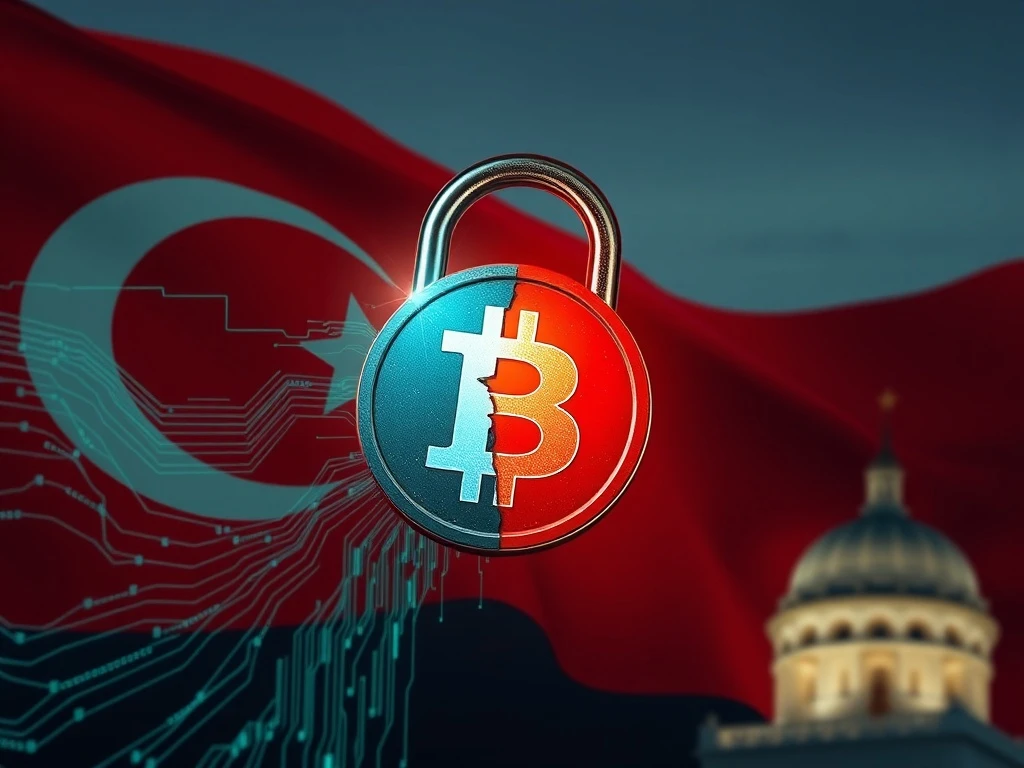BtcTurk Faces Urgent Crisis: $48M Crypto Hack Rocks Turkish Cryptocurrency Exchange

The cryptocurrency world often experiences rapid shifts. Therefore, news of a major security incident can send immediate ripples through the market. A recent alarming development involves **BtcTurk**, a prominent Turkish **cryptocurrency exchange**. The platform has halted all cryptocurrency withdrawals. This action follows widespread reports of a significant **crypto hack**, potentially involving millions in digital assets.
BtcTurk Halts Withdrawals Amid Suspected Fund Loss
Reports emerged quickly on Thursday, detailing unusual activity. Cybersecurity firm Cyvers took to X, a social media platform, to share its findings. Cyvers stated that its systems detected approximately $48 million worth of digital assets. These assets, including Ether (ETH), AVAX, ARB, BASE, OP, MANTLE, and MATIC, showed highly suspicious movements. This extensive activity across multiple networks immediately raised alarms within the security community. Consequently, the firm highlighted the potential for a substantial **fund loss**.
Following these alerts, **BtcTurk** confirmed the halt of deposits and withdrawals. The exchange cited a “technical issue” with its hot wallets. However, trading operations and Turkish lira deposits and withdrawals remain active. The official announcement from BtcTurk, issued at 12:43 pm UTC, reassured users that other services were unaffected. “Due to a technical issue in hot wallets, cryptocurrency deposits and withdrawals are halted,” the exchange stated. “Further notification will be shared once they are back up. Crypto buy and sell orders, as well as Turkish lira deposits and withdrawals are uninterrupted.” This situation remains dynamic, with more information expected.
The Immediate Impact on Digital Asset Security
This incident underscores the ongoing challenges in maintaining robust **digital asset security**. Hot wallets, while convenient for active trading, are inherently more vulnerable to attacks than cold storage solutions. They are connected to the internet, making them potential targets for malicious actors. Conversely, cold wallets store assets offline, offering a higher degree of protection. The suspected **crypto hack** on BtcTurk highlights the critical importance of strong security protocols for any **cryptocurrency exchange**. Furthermore, it serves as a stark reminder for users to understand the risks associated with leaving large amounts of funds on exchanges.
Investors frequently rely on exchanges for easy access to their funds. However, such incidents erode trust. They also prompt users to consider self-custody solutions more seriously. For instance, hardware wallets provide a secure way to store cryptocurrencies offline. This allows individuals to maintain direct control over their private keys. While exchanges strive for top-tier security, no system is entirely impervious to sophisticated attacks. Therefore, users must remain vigilant and diversify their storage methods.
Understanding the Nature of the BtcTurk Incident
Cyvers’ initial report detailed how the attacker allegedly moved assets to two distinct addresses. Subsequently, they began swapping these digital assets. This tactic is common in hacking incidents, as attackers attempt to obscure the trail of stolen funds. They often convert various altcoins into more liquid assets like ETH or BTC, then move them through mixers or other exchanges. Such actions complicate the recovery process significantly for affected platforms. The speed and scale of the alleged **fund loss** indicate a highly coordinated attack. This points to the sophistication of modern cyber threats targeting the crypto space.
Law enforcement agencies and cybersecurity experts will likely investigate this incident thoroughly. Their efforts will focus on tracing the stolen funds and identifying the perpetrators. The crypto community often collaborates in these situations, sharing intelligence to combat illicit activities. This collective response is crucial for enhancing overall **digital asset security** within the ecosystem. Moreover, it helps to prevent future breaches.
Implications for the Cryptocurrency Exchange Landscape
The **BtcTurk** incident will undoubtedly trigger increased scrutiny on **cryptocurrency exchange** security measures globally. Exchanges may face renewed pressure to implement even more stringent safeguards. These could include enhanced multi-factor authentication, regular security audits, and more robust cold storage policies. Furthermore, regulatory bodies might intensify their oversight. They could introduce new requirements for exchanges to protect user assets. This proactive approach aims to minimize the risk of future large-scale **fund loss** events.
For users, the advice remains consistent: only keep funds on an exchange that you intend to actively trade. For long-term holdings, consider transferring assets to a personal hardware wallet. Always verify official announcements directly from the exchange. Be wary of unofficial reports or phishing attempts that may capitalize on such situations. This incident reinforces the need for both platforms and users to prioritize security above all else in the volatile world of digital currencies.
Moving Forward: The Response and Recovery Efforts
As this is a developing story, **BtcTurk** will provide further updates. The exchange’s immediate priority is to restore full service safely. They must also communicate transparently with their user base. Trust is paramount in the crypto industry. Therefore, clear and consistent communication is vital during a crisis. Users are encouraged to monitor BtcTurk’s official channels for the latest information. This ensures they receive accurate updates on the resolution of the “technical issue” and the resumption of withdrawals. The broader **cryptocurrency exchange** community will also closely watch the recovery efforts. This will provide valuable lessons for improving **digital asset security** across the board.









